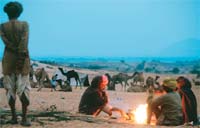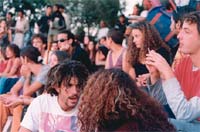
PUSHKAR YEAR 2002
Does Pushkar resent being gawked?
Despite gloomy travel advisories from the US and UK, the backpackers thronged the fair, turning the lake into a California beachfront, writes
Hell-Oh, the Pushkar market mantra follows you, which con-tree you from? Nobody with denim jeans and a camera is spared and brown skin is no passport to Indianness: What if you were a Person of Indian Origin and were carrying greenbacks instead of rupiyahs? Hell-oh, madame, which con-tree you from?
India.
Arrey, yeh to Hindustani gudiya hai!

And gawd, the B-A-R-G-A-I-N-S! All the silver nothings, the faux silk Chinese pyjamas, the leather jutties and the chic mirrorwork belts!! The mela ground where farmers and traders haggle for cheaper camels and cows is a few hundred metres away, beyond the invisible line that separates Their Pushkar and the Pushkar of the Others.
This “bewitching little town”, 11 kms from Ajmer is thought to be a karma cola prototype, the date-gone-wrong between East and the Rest, the Kumbh Mela’s doomed future. The menus boast of copious explorations of Continental cuisine; there are signs in Hebrew all over, in deference to the intrepid globe-trotting Israelis; everybody speaks first in English. But if Pushkar manages to retain its sanity in the face of undiscerning tourism, it’s because this tiny town still has a big enough heart for both the pilgrim and the dharma traveller.
 |
|
There are two Pushkars, Theirs’ and
Others’. If Pushkar manages to retain its sanity, it’s because the tiny
town has a heart big enough for both the pilgrim and the dharma traveller
|
This classic cultural intersection takes place within an amazingly tiny space. The Brahma temple (Pushkar is the site for the only temple for the creator of the universe in the country), the little lake where the annual kartik purnima puja is held, the ground where camels and cattle are traded, the hilltop Savitri temple, the marketplace all lie to the left of the Central Bus Stand. Get off the rattling bus and any lane, any pathway takes you there. The lake, the 50-odd ghats and the temples that ring it are astonishingly small.
The second Pushkar mela after 9/11 and the first after Akshardham extracted its special price. The tourist-savvy Rajasthanis had an edge to their cries, put there by the drought, by the gloomy travel advisories issued by the US and UK, by the terror of yet another terrorist strike. Policemen were spotted everywhere, at the ghats and the temples, perched atop the rooftop restaurants, glowering at the alley corners. Rajasthan Armed Constabulary men were even stopping buses on their way to Pushkar, poking their weapons into cloth bundles and asking pilgrims their antecedents.
These travel warnings and all are bad for business, said a restaurant owner gloomily, the tourists have cancelled their bookings. The akaal is bad for business, said a camel handler at the mela ground. Want a ride? 100 rupees only.
However, nowhere else does East meet — and conflict with — the Rest better than at the ghat with the best view of the sunset, the Jodhpur Ghat. Each evening, as the sun begins to disappear, a tourist ritual all those guidebooks missed unfolds: The sound of drums beats echo around the ghats, a jungle beat summoning the faithful. Within minutes, it seems, the ghat is awash with dreadlocks, spaghetti straps, white skin. And Orthodox Jews praying to the rays of the setting sun, under the stern eye of a rabbi in a black coat, a pointed hat and gold-rimmed glasses. A fire-eater starts his act, a local twirls coloured ribbons and soon enough, the foreigners have joined him. The locals are now the voyeurs: they watch this homecoming with unmasked curiosity, envy, resentment.
They do this every evening, we hate them, snarls a local priest. He and his ilk have spent all day wheedling the foreigners and haranguing the Hindus into chucking a flower into the lake in the name of salvation. This isn’t our culture, we will ensure we get them out of here, he says.
But they’re here to stay for the evening and the one after. By the time the sun’s gone, all the rules have bent out of shape. Flashbulbs twinkle in the evening light, cigarettes are lit faster than they can be stubbed out. It could have been Jerusalem, New York, a beachfront in California. It just happened to be Pushkar.
The pilgrims kept miles away from Jodhpur Ghat. They slipped their flower boats and oil lamps into the lake from other shores. The ones who seemed to have found their way here by mistake gaped as they walked by. They slipped away soon enough — for once, they seemed to be the foreigners.
EMAIL WEBYATRA@YAHOO.CO.IN